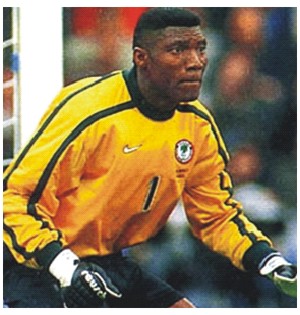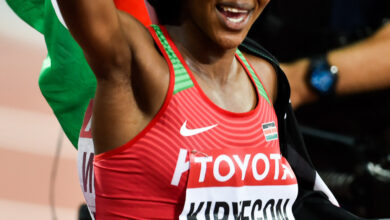Peter Rufai Biography: Family, Career, Net Worth, Age 2025

Peter Rufai Biography: Peter Rufai is a name synonymous with excellence, resilience, and leadership in Nigerian football. Widely regarded as one of Nigeria’s greatest football goalkeepers, his career spans over two decades and includes notable achievements in both the domestic and international football arenas.
From his early beginnings in Nigeria to his illustrious European club career and role in Nigeria’s national team, Rufai has cemented his status as a true legend in the world of football. Today, in 2025, Peter Rufai remains a prominent figure in Nigerian football, inspiring new generations of players with his legacy.
This biography aims to provide a comprehensive, detailed, and insightful look into the life of Peter Rufai. From his early years to his rise in international football, his family life, personal life, career highlights, and net worth, this article provides all the necessary details about the football icon. Whether you’re a football enthusiast, a sports historian, or simply a curious reader, you’ll find a wealth of information about this Nigerian football legend.
Peter Rufai Biography
Peter Rufai was born on August 24, 1963, in Lagos, Nigeria. His full name is Peter Fatai Rufai, and he hails from a royal family in the Idimu area of Lagos. Despite his royal background, Rufai chose the path of football, and his decision to pursue the sport has had an indelible impact on Nigerian football history. From a young age, he demonstrated a natural talent for the game, particularly in goalkeeping, a position he would go on to master and which would define his entire career.
Growing up in Lagos, Rufai’s early exposure to football came from playing with local clubs in his neighborhood. Like many young players, he began his football career at the grassroots level, where his athleticism and goalkeeping skills started to take shape. His remarkable talent did not go unnoticed, and soon, he was playing for more prominent local clubs. His breakthrough came when he joined Stationery Stores and later Femo Scorpions, two well-known teams in the Nigerian domestic football scene. His performances in these teams quickly earned him attention from both local and international scouts.
While Rufai’s royal background might have suggested a different path for him, it was his relentless passion for football that drove him to pursue the game professionally. His decision to break away from tradition to chase his dream is a testament to his unwavering determination and commitment to his goals.
From Nigeria to Europe: A Glorious Club Career
Peter Rufai’s footballing journey took a significant turn in 1987 when he moved to Belgium to play for K.S.C. Lokeren. This marked the beginning of his international career as Rufai transitioned from the Nigerian domestic league to the competitive European football scene. His time at Lokeren helped hone his skills and build his reputation as a top-tier goalkeeper.
After his time at K.S.C. Lokeren, Rufai joined K.S.K. Beveren in 1991. At Beveren, Rufai continued to develop his game, becoming known for his leadership qualities, composure under pressure, and incredible reflexes. His performances in Belgium were instrumental in solidifying his standing as one of the top African goalkeepers in Europe.
In 1993, Rufai made another significant move to The Netherlands, joining Go Ahead Eagles. In the Eredivisie, he faced some of the most challenging attackers in Europe. His time in the Netherlands proved to be a pivotal period in his career as he adapted to European football and continued to evolve as a goalkeeper.
In 1994, Rufai’s career took him to Portugal, where he joined S.C. Farense. His performances at Farense were exceptional, earning him widespread recognition across Europe. At Farense, Rufai became a household name in Portuguese football, helping the club achieve notable successes during his tenure. His time in Portugal was a career-defining moment, as he played at the highest level in European football.
Following his successful stint in Portugal, Rufai moved to Spain in 1997, joining Hércules CF before finally making his way to Deportivo La Coruña. His role at Deportivo La Coruña was that of a backup goalkeeper, but even in this capacity, Rufai’s experience and leadership were valuable assets to the team. Despite not being the team’s first-choice goalkeeper, he continued to make significant contributions to the team’s efforts. His time in Spain marked the final chapter of his club career in Europe.
In his later years, Rufai played for Gil Vicente FC in Portugal, where he closed the final chapter of his professional club career in 2000. Rufai’s time at these clubs not only solidified his position as one of the top African goalkeepers of his era but also made him a widely respected figure in European football.
International Career: Representing Nigeria on the World Stage
Peter Rufai’s impact on football extended far beyond his club career. He was a vital member of the Nigerian national team, the Super Eagles, earning 65 caps for his country between 1983 and 1998. His international career was highlighted by his participation in two FIFA World Cups (1994 and 1998) and his crucial role in Nigeria’s victory at the Africa Cup of Nations in 1994.
1994 FIFA World Cup
One of Peter Rufai’s most memorable moments came during the 1994 FIFA World Cup in the United States. Nigeria made an impressive run to the Round of 16, and Rufai’s performances in goal were crucial to the team’s success. His calm demeanor, leadership, and incredible reflexes enabled Nigeria to compete against the world’s best teams, including Argentina and Bulgaria. Rufai’s contribution to Nigeria’s World Cup campaign solidified his status as one of the best goalkeepers in African football history.
1998 FIFA World Cup
Peter Rufai also represented Nigeria in the 1998 FIFA World Cup in France. Although Nigeria’s World Cup campaign ended earlier than expected, Rufai’s leadership and skill in goal were once again evident. His performances in both World Cups helped solidify his reputation on the world stage as a dependable and skilled goalkeeper.
In addition to the World Cups, Rufai played a key role in Nigeria’s Africa Cup of Nations victory in 1994. His performances during this tournament were instrumental in Nigeria’s success, as they went on to win the prestigious continental trophy. His goalkeeping skills and leadership were vital to Nigeria’s overall success during this period.
Peter Rufai Personal Life: Family, Spouse, and Philanthropy
Peter Rufai Personal Life: Peter Rufai’s personal life has always been an essential part of his story. He is married to Mikaila Rufai, and they have four children together. His son, Senbaty Rufai, followed in his father’s footsteps and briefly played for the Sunshine Stars in the Nigerian Premier League. Rufai’s commitment to family has been one of the cornerstones of his life, and he has often spoken about how important his family is to him.
In addition to his family, Peter Rufai is also dedicated to giving back to the community. Through his football academy, Staruf Sports Development Limited, Rufai has worked to nurture the next generation of Nigerian football talent. His academy has helped train and mentor numerous young players, many of whom have gone on to play at the professional level.
Rufai’s philanthropic efforts extend beyond football. He is known for his community involvement and commitment to social causes, particularly in the areas of education and youth development. His legacy extends far beyond the football pitch, as he continues to inspire young people through his work both on and off the field.
Peter Rufai Net Worth and Business Ventures
Peter Rufai Net Worth: Peter Rufai’s net worth is estimated to be $4 million as of 2025. His wealth is primarily derived from his successful football career, including his time at various European clubs and his role with the Nigerian national team. In addition to his football earnings, Rufai has also made substantial income from his entrepreneurial ventures, particularly his football academy, Staruf Sports Development Limited.
Rufai’s financial success is a reflection of his hard work, talent, and dedication to both his sport and his business ventures. As a prominent figure in Nigerian football, his name is well-known, and his influence extends far beyond his playing days. Today, Rufai remains a respected figure in the football world and continues to make significant contributions to the sport.
Legacy and Influence on Nigerian Football
Peter Rufai’s legacy will endure for generations to come. He was not only one of the best goalkeepers to have ever played for Nigeria but also a trailblazer who helped put Nigerian football on the global map. His leadership, work ethic, and commitment to excellence have inspired countless young players, and his influence on Nigerian football remains a lasting legacy today.
Through his academy and his mentorship of young players, Rufai is ensuring that his impact on Nigerian football continues long after his playing days have ended. His contributions to the development of football in Nigeria have laid the foundation for future generations of players, and his legacy as a player, mentor, and philanthropist will remain deeply ingrained in the history of Nigerian football.
Conclusion: Peter Rufai – A Football Legend
Peter Rufai’s journey from Lagos to becoming one of Nigeria’s most iconic footballers is a story of passion, perseverance, and success. His career in both domestic and international football, his contributions to the Nigerian national team, and his post-retirement work in developing the next generation of football talent have cemented his place as a true football legend.
At the age of 61, Peter Rufai’s impact on Nigerian football remains enduring. With a net worth of $4 million, his career has been financially successful, and his legacy as a player and mentor remains strong. Peter Rufai’s influence on Nigerian football is undeniable, and his story continues to inspire young players across Nigeria and beyond.
Peter Rufai is a football legend whose story will continue to inspire future generations. If you are a fan of football or someone looking to learn from the lives of sporting legends, Peter Rufai’s biography is a must-read.




